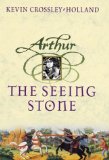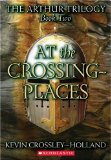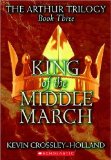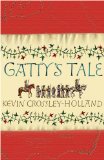
 Gatty’s Tale by Kevin Crossley-Holland
Gatty’s Tale by Kevin Crossley-Holland
I picked up this book from the library on an impulse: my current topic of interest is the Crusades, and Gatty’s Tale, looked as though it would satisfy this itch. Chronicling the journey of a young girl who undertakes a pilgrimage, Kevin Crossley-Holland takes his spunky little protagonist on a fascinating journey from Wales to Jerusalem, as well as from girlhood to womanhood.
The year is 1203, and Gatty is a fifteen year old field-girl employed by Lady Gwyneth de Ewloe as a chamber-servant to accompany her on a pilgrimage to the Holy Land. Lady Gwyneth wants to travel to Jerusalem to obtain forgiveness from some as-yet unknown sin, and has gathered together nine pilgrims to make the journey with her across Europe to the heart of the world.
The pilgrims are an assorted lot: a husband and wife, a music teacher, a lady-in-waiting, a priest, a cook… all of them make up an extended family as they brave the perils of the journey over mountain and across desert, and we are with them as they squabble, pray, suffer, tell stories, joke and grieve their way across Europe in a fellowship that is not unlike those of “The Canterbury Tales.” As they say, it is the journey and not the destination that is important, and not one of our pilgrims, least of all Gatty herself, is left unchanged by the experiences and trials they go through.
Although I’m no expert on the subject, the book seems to be meticulously researched, and Crossley-Holland has a gift of making medieval life seem real and immediate. One of the greatest challenges of writing historical-fiction is to not only make the past come to life, but to write in a way in which the differences between then and now are integrated into the story itself, and not presented to the reader as story-halting info-dumps. Holland expertly weaves the day-to-day life of the pilgrims into the narrative without alienating or confusing the reader.
Gatty makes for a lovely young heroine. Although only a field-girl, she is impulsive, bright, compassionate, and possesses an innate sense of wisdom and openness to the world around her that makes for several thought-provoking moments. She compares her journey to a story that contains several forever-unknown stories within it, referring to the people she meets or sees on her way, and on returning from her great pilgrimage and attempting to share her experiences with a friend, she realizes that “no one is really quite as interested in us as we are in ourselves.”
Crossley-Holland also gifts Gatty with a beautiful singing voice that grows and develops at the same rate that she does, and has a solid grasp on her speech patterns that provide much of the charm of this book. All of it serves to make Gatty a living, breathing young woman and one of the most vivid characters I’ve come across in a long time.
However, not all of Gatty’s companions make it to the Holy Land; in fact most are abruptly dropped from the narrative, not from death, but other extenuating circumstances. Sadly, once they are gone we never meet up with (most of) them again. Perhaps this adds to the realism of the book, in that we lose some people along the way, but from a storytelling perspective, it feels as though Crossley-Holland simply got tired of them and wrote them out of the story. But by this stage, I had grown quite attached to some of the pilgrims, and was disappointed that we never got to see them again (and only discover their fates from a third-hand account).
It also became apparent to me early on that Gatty’s Tale was in fact a “spin-off” of sorts from Crossley-Holland’s award-winning Arthur trilogy, which I have yet to read. Although I immensely enjoyed Gatty’s Tale, I’m sure that it would have carried more meaning and resonance for me if I had read the previous trilogy, in which Gatty’s life, friendships, and personality were established. Though I highly recommend Gatty’s Tale I’d first recommend tracking down The Seeing Stone and its sequels in order to get a firmer grasp on Gatty’s history and what she means to the author.
The Arthur Trilogy — (2000-2003) Ages 9-12. Publisher: The year is 1199, and on the borders of England and Wales young Arthur de Caldicot waits impatiently to grow up and become a knight. One day his father’s friend Merlin gives Arthur a shining black stone, and he starts to see stories of his namesake, King Arthur. As the stories of the two Arthurs intertwine, the narrative builds to a thrilling and mysterious climax.







I really enjoyed this book. I agree with your comments about Gatty – she is a realy strong and endearing main character. I preferred the Arthur series though. I love the poetic nature of those books. A really interesting review to read.
Looks good — I’ll try this one!